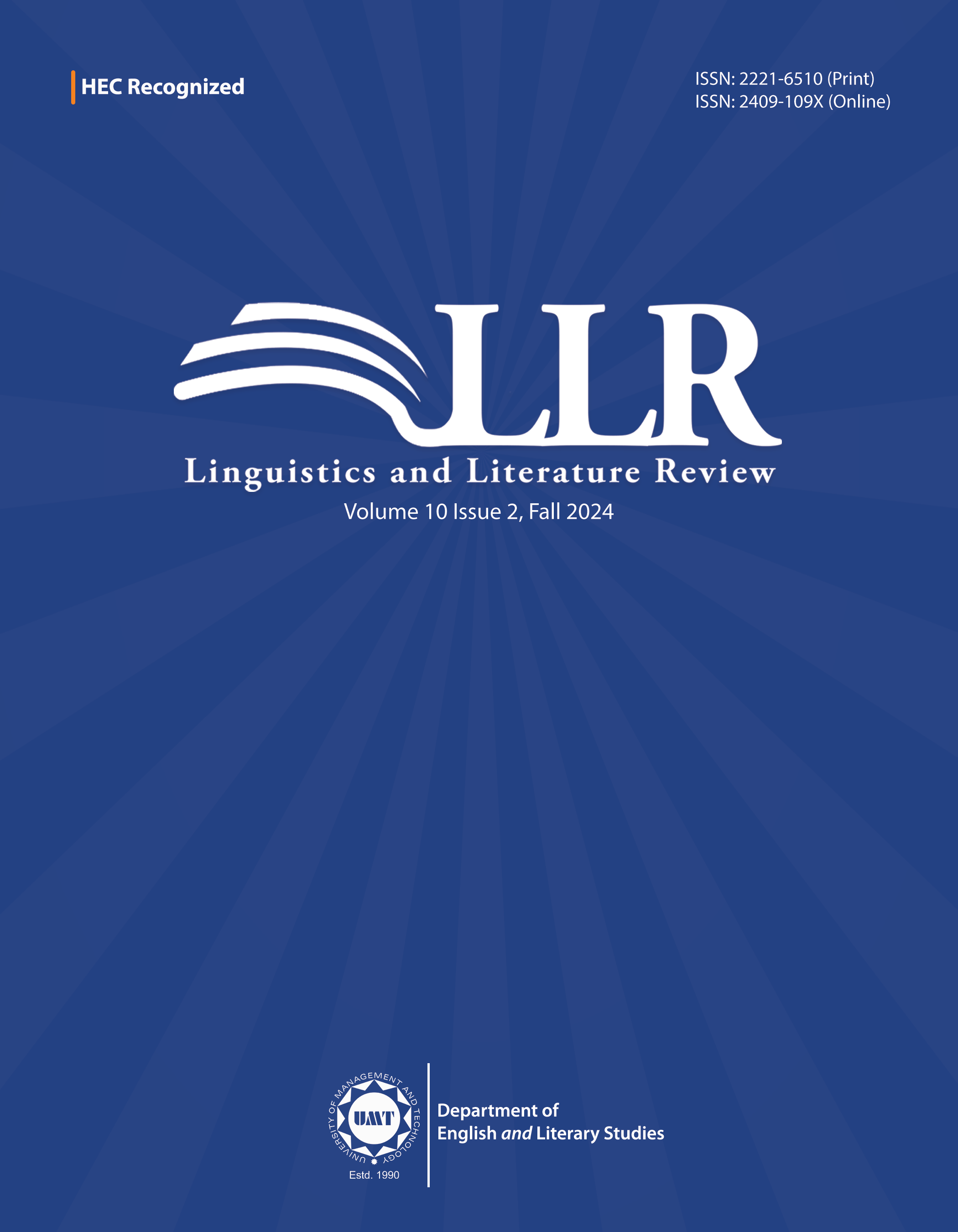Writing Trauma: Poetics of Cultural Trauma and Memory in Anglophonic Kashmiri Literature
Abstract
 Abstract Views: 0
Abstract Views: 0
This study concentrates on the Anglophonic literature produced in the region of Jammu and Kashmir. It explores its narratives through the lens of trauma theory, pertaining to the region’s history of forced conflict. After the Second World War, the relevance of trauma in literary studies has increased and texts have been characterized by an archeology of traumatic consciousness. Also, the narratives act as vehicles for transmitting stories of suppressed and wounded consciousness. This research focuses upon Mirza Waheed’s (2011) novel The Collaborator and Basharat Peer’s (2010) memoir Curfewed Night as the primary texts and investigates the art of writing trauma by exploring the narrative structures deployed by the authors. The objective is to find out as to how the very act of writing trauma is shaped by traumatic memories of a past rooted in the partition conflict, war, and prolonged violence. Furthermore, the study probes into how the fictional characters embody and express pain and anguish as part of their memories. The key focus remains on how both the works portray the (un)speakability of grief and the (in)comprehensibility of trauma drawing on some of the seminal contemporary theories of cultural trauma and memory studies. Using qualitative methodology and trauma theory as the theoretical framework, it is concluded that apart from presenting reality as horrific, gloomy, and glim, Kashmiri texts discuss how causalities create memories riddled with unspoken fears by bringing forth the intricacies of speechless terror and trauma. Thus, the study captures the narration’s struggle to represent evasive and suppressed memories and the challenges of trauma writing.
Downloads
References
Alexander J. C., Eyerman R., Giesen B., Smelser N. J., & Sztompka P. (2004). Cultural trauma and collective identity. University of California Press.
Alexander, J. C. (2016). Culture trauma, morality and solidarity: The social construction of ‘Holocaust’ and other mass murders. Thesis Eleven, 132(1), 3–16. https://doi.org/10.1177/0725513615625239
Ali, R. F. (2015). Kashmir: A century struggle (1846-1948). Institute of Public Policy Research and Development. https://independent.academia.edu/RaoFarmanAli
Balaev, M. (2014). Contemporary approaches in literary trauma theory. Palgrave Macmillan.
Bergson, H. (1911). Matière d mémoire [Matter and memory] (N. M. Paul & W. S. Palmer, Trans.). George Allen & Unwin. (Original work published 1896)
Caruth, C. (1996). Unclaimed experience: Trauma, narrative and history. The Johns Hopkins University Press.
Caruth, C. (1991). Unclaimed experience: Trauma and the possibility of history. Yale French Studies, 79, 181–192. https://doi.org/10.2307/2930251
Caruth, C. (1995). Trauma and experience. In C. Caruth (Ed.), Trauma: Explorations in memory (pp. 3–12). The John Hopkins University Press.
Cioffi, F. L. (1999). Postmodernism, Etc.: An interview with Ihab Hassan. Style, 33(3), 357–371.
Derrida, J. (1979). Living on (J. Hulbert, Trans.). In H. Bloom, P. de Man, J. Derrida, G. H. Hartman & J. H. Miller (Eds.), Deconstruction and criticism (pp. 75–176). Continuum.
Faheem, M. A., Asif, M., & Ahmed, S. (2023). Islamophobia and (Wes) toxification: A Hermeneutical and phenomenological reading of John Updike’s TERRORIST. Pakistan Languages and Humanities Review, 7(2), 448-454. https://doi.org/10.47205/plhr.2023(7-II)39
Felman, S., & Laub, D. (1992) Testimony: Crises of witnessing in literature, psychoanalysis, and history. Routledge.
Freud. S. (1920). Beyond the pleasure principle. The Hogarth Press.
Hanif, S., & Ullah, I. (2018). War trauma, collective memory, and cultural productions in conflict zones: Kashmir in focus. Sage Open, 8(3), 1–10. https://doi.org/10.1177/2158244018800912
Kacandes, I. (2001). Talk fiction. Literature and the talk explosion. University of Nebraska Press.
Kaul, S. (2011). "An 'You will fight, till the death of it…": Past and present in the challenge of Kashmir. Social Research: An International Quarterly, 78(1), 173–202. https://doi.org/10.1353/sor.2011.0011
Kaul, S. (2012). A time without soldiers: Writing about Kashmir today. Historical Reflections, 38(2), 71–82. https://doi.org/10.3167/hrrh.2012.380206
Llobera, J. R. (1995). Halbwachs, Nora and" history" versus" collective memory": A research note. Durkheimian Studies, 1, 35–44.
Morrison, T. (1984). Memory, creation, and writing. Thought, 59(235), 385–390.
Nandi, S. (2016). Trauma and its traces in the poetry of Paul Celan. Spring Magazine on English Literature, 2(1), 50–57.
Peer, B. (2010). Curfewed night: A frontline memoir of life, love and war in Kashmir. Harper Press.
Piatek, B. (2014). History, memory and trauma in contemporary British and Irish fiction. Jagiellonian University Press.
Roy, A., Mishra, P., Bhatt, H., Chatterji, A. P., & Ali, T. (2011). Kashmir: The case for freedom. Verso Books.
Waheed, M. (2011). The collaborator. Penguin Book Publishers.
Whitehead, A. (2004). Trauma fiction. Edinburgh University Press.
Whitehead, A. (2009). Memory: The new critical idiom. Routledge
Wittgenstein, L. (1961). Tractatus logico-philosophicus. Routledge.
Copyright (c) 2024 Rabia Ashraf, Rizwan Akhtar

This work is licensed under a Creative Commons Attribution 4.0 International License.

This work is licensed under a Creative Commons Attribution 4.0 International License. Authors retain copyright and grant the journal right of first publication with the work simultaneously licensed under a Creative Commons Attribution (CC-BY) 4.0 License that allows others to share the work with an acknowledgment of the work’s authorship and initial publication in this journal.







